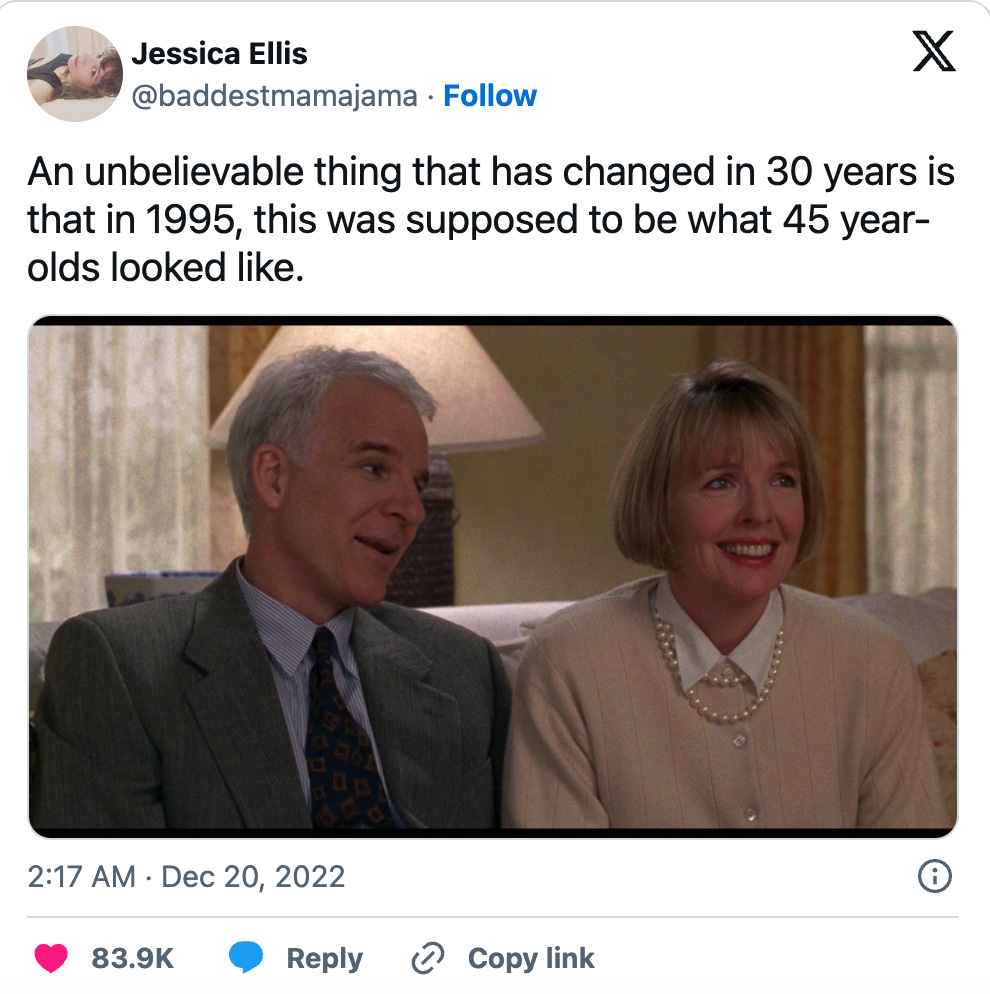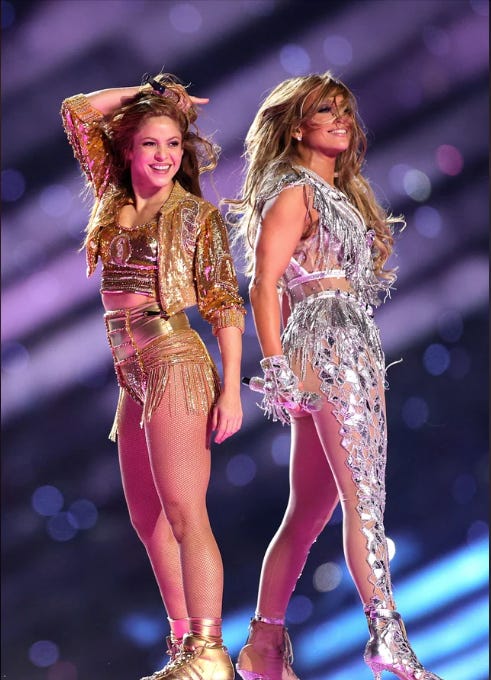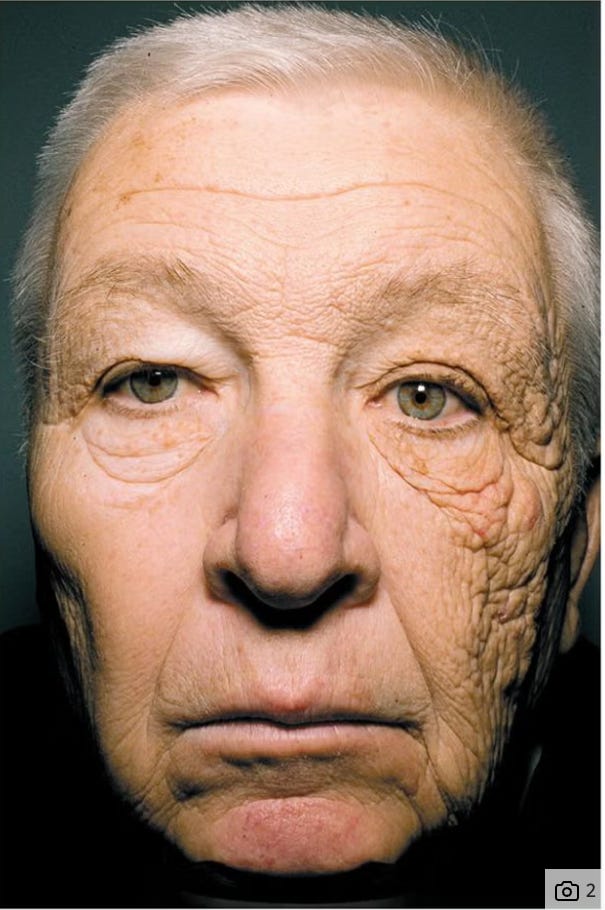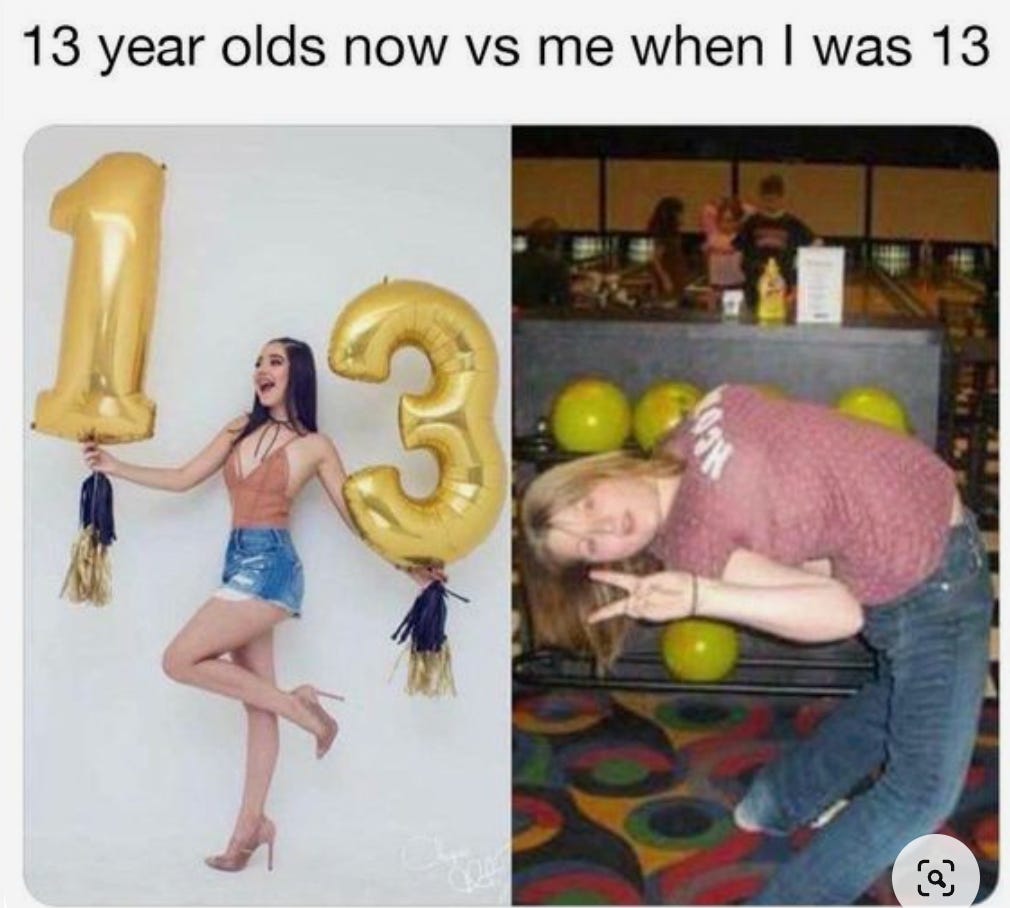🗣️ Looking for the read-aloud version of Nina’s Notes?
Click the button below to listen to all the episodes. If you didn’t already know, I narrate them all myself! It’s not an AI generated voice, it’s ME!
Check it out on Apple Podcasts and Substack Podcasts.
Hey Friends,
I gave a talk about health and longevity a while back and after the talk, several people from the audience came up to me and asked,
“How old are you?”
I ask them why they ask and they usually say something along the lines of -
“You look young, but you have quite the resume so you must be older than I think”
I have them guess and they say…
28.
Gasp!
As some of my readers know, I celebrated my 36th birthday in December.
The audience guessed I was nearly a decade younger than my chronological age.
As a longevity enthusiast, I am obsessed with biological age versus chronological age.
Comments like this reassure me that my longevity routine must be paying off (hint: a healthy diet, exercise everyday, weight training, sleeping 8 hours each night & never smoking).
And it seems that the internet has gone crazy thinking that Millennials are aging slower than the previous generations.
And in an even spicier conversation, Gen Z thinks they are aging faster.
I dive into it all in my latest note.
It’s mostly Pop culture, but I try to get down to the science.
Enjoy.
💬 In this note:
🐢 Are Millennials Aging Slower?
📚 Intellectual Property Strategy
⚡️ Symble
🐢 Are Millennials Aging Slower?
Disclaimer: I mean absolutely no age-shaming here. It is a blessing and a privilege to age. Our idea of what aging looks like is completely warped by social media, movies and advertising.

The internet has recently exploded with a few videos around Millennials aging compared to Gen Z aging.
Millennials are looking fantastic for their age and TikTok creator Chris Bautista says it well.
“We are setting a new standard for what it looks like to age”
🔥
He also shows some great comparisons to what Millennials grew up thinking 30-40 looked like.
In 1995 I was 7 years old and, thanks to Hollywood’s depiction of the characters of Nina and George Banks in Father of the Bride Part II, I thought this is what 45 year olds looked like. In the film, Diane Keaton’s character, Nina Banks, has a baby at the same time as her daughter, Annie Banks, who is 22 in the film.
While clothing and hair styles are the main culprit here, the style is not far off from what 45 year olds were wearing at the time.
This style of “country club chic,” with pearls and a sweater, was actually accurate for that age group in the 90s. Even though I think of that look being stylish for my grandparents era.
Nowadays we’ve see Shakira and JLo performing at the Superbowl at 43 and 50 respectively, looking like absolute smokeshows, setting a new standard for what aging looks like in your 40s and 50s.
Photo Source: Reddit
Despite Hollywood’s many attempts at messing with our heads about how we perceive age, is there actually any scientific evidence for Millennials aging “slower”?
What Millennials Are Doing Right For Their Aging
There is a hypothesis that Millennials are looking “younger” than they should because they don’t smoke cigarettes and are diligent about sunscreen.
In the 2001-2003 period, Gallup reported that the smoking rate of young adults aged 18-29 in the US was 35%, this would be the smoking rate of the “elder millennials.” In 2023, Gallup repeated the survey and found only 17% of the Millenials now aged 30-49 reported having smoked cigarettes in the past week.
This significant decline could have had substantial effects on the aging process for Millennials.
It is estimated that heavy smoking (up to 30 cigarettes a day = roughly 1.5 packs a day) can make your skin appear 14 years older by the time you hit 70.
Recent data from Statista indicates that 40 percent of adults in the U.S. now use SPF on a daily basis, thanks to the increasing understanding of the sun's impact on aging.
I remember this photo published in 2012 in the New England Journal of Medicine on the effects of skin aging. The photo shows a 69-year old truck driver’s face where the effect of prolonged sun exposure and subsequent damage on the left side of his face is shocking.
The right side of his face which was not facing the window while he drove is far less wrinkled and aged in appearance.
Caption: (New England Journal of Medicine)The jarring effects of UV radiation
I think this one study did the trick for the Millennials. I t makes you never want to leave home again without using SPF.
There are also more harsh hypotheses that Millennials just can’t “grow up.”
Gen X and the Boomers owned homes and had kids in their 20s, which are very “adulty” things to do.
A study by the Pew Research Center shows that millennials are postponing or opting out of marriage more than previous generations.
Slightly less than half of individuals aged 25 to 37 are married, marking a sharp decrease from the 83 percent marriage rate observed in the Silent Generation (those born between 1900-1945) back in 1968.
And Millennials, without those responsibilities, appear to society as younger, less responsible and less “adult.”
But Millennials aren’t doing everything well.
Millennials, in general, are not getting enough physical activity, typically drank a lot of alcohol in their twenties and many continue to do so.
Now, on the other hand…
Is Gen Z Aging “Faster”?
In January, an article was published in The New York Times titled “Why Does Gen Z Believe It’s ‘Aging Like Milk’?”
This article was a result of several youtube videos and TikToks about how Gen Z looks older than they should for their age.
One TikTok video that has been viewed nearly 20 million times where creator Jordan Howlett, a 26-year old man with a dense beard, glasses and incredibly wise voice, says that he thinks Gen Z look more mature because of the stressors put on the generation.
In another viral TikTok video, it shows a young woman outraged that commenters thought she was in her early 30s, and she revealed she is just 23.
As a female Millennial, when I look at Gen Z, I’ve always been envious of their skills with makeup.
YouTube makeup tutorials did wonders for this generation.
They are WAY better at makeup than I was at their age, and better at makeup then I am now.
And, they have been better at makeup for a decade.
I believe one reason they look older than their age is because these impressive makeup skills make them look more mature because of their artistry.
I remember seeing photos of Gen Z on Instagram a decade ago and thinking…omg, when I was 13, I looked nothing like this.
I am not alone.
There are entire reddit threads about it and hundreds of memes.
Gen Z has nailed glam.
But with that, they nailed looking a bit older than their natural age.
Looking a little older in your teenage years can sometimes feel like an advantage.
But now that they are in their mid-20s and looking in their early 30s, I can understand the shock.
There may also be an influence from Millennials, both with makeup and other anti-aging trends, that are impacting Gen Z.
So Gen Z ends up looking in their mid-30s by following these anti-aging trends that are capturing the Millennials.
Some of those anti-aging trends are ones like botox or fillers.
Gen Z, you don’t need botox or fillers.
You are youthful and beautiful.
Please don’t let the internet/media/advertising tell you otherwise.
While I’m at it, Millennials, you also don’t need Botox or Fillers.
You look young. You are young. You are vibrant and bright.
Aging is a beautiful thing.
What Gen Z Is Doing Right For Their Aging
Gen Z is not drinking alcohol.
According to a study published in JAMA Pediatrics in 2020, the percentage of college students aged 18 to 22 in the United States who stated that they do not drink alcohol rose from 20% in 2002 to 28% in 2018.
When it comes to opinions on drinking among Gen Z, more than 25% say they are ‘very concerned’ about the potential health effects of drinking alcohol.
For some Gen Z adults, drinking alcohol is going the way of the cigarette – 23% say it will become less popular in the next few years, the highest percentage among all generations.
Meanwhile, nearly two-thirds of Gen Z adults say that non-alcoholic beer is going to grow in popularity and become more commonplace, compared to just 46% of Millennials and 19% of Gen Xers.
The low- and no-alcohol movement also has its greatest appeal among Gen Z, as shown in a CivicScience study on interest in non-alcoholic beverages.
Given the growing body of evidence against drinking, this should come as no surprise.
Alcohol poses long-term and serious risks, such as cardiovascular disease, diabetes, cancer, liver disease and mental health issues.
A 2023 Canadian study found that even low levels of alcohol consumption can raise the risk of mortality.
Let me scare you even more, a study published in the journal Nature in March 2022 suggested that consuming one glass of alcohol per day may lead to brain shrinkage.
I think drinking less or not drinking alcohol at all is going to pay off for Gen Z in terms of healthspan and aging.
While they may think they are looking physically older now, I bet in several decades, Gen Z will look great, be enjoying a better healthspan and have fewer cases of high blood pressure and liver disease.
Let’s test it! Biological Age vs. Chronological Age
Nowadays we have the tools to measure biological age with DNA methylation tests.
I covered biological age in Nina’s Notes #24, “Do You Know Your Rate of Aging?”
With these tools we can quantitate the difference between someone’s chronological age and their biological age.
While the studies haven’t been done yet, I would love to see cohort studies of Gen X, Millennials and Gen Z to measure the difference between biological age versus chronological age.
Then we can really prove who is aging faster or slower than the other generations.
📚 Book of the Week
Photo by me
Intellectual Property Strategy by John Palfrey
Rating: ★★★★★
I know this is a super “boring” book of the week, but actually I found it so interesting.
It’s a really quick read, only 192 pages, and I finished it on a flight between Lisbon and London.
It’s a read for anyone, as all of us are creating intellectual property all the time.
If you own a company, are thinking of starting a company, or are an inventor - then you definitely need to read this book.
I think a common misconception about Intellectual Property is that it means a patent or a patentable invention.
But that is not true.
Intellectual property is defined as “intangible property that is a result of creativity.”
We are all creative beings. It is in our nature to create.
And knowing when and how to protect those creations is absolutely essential.
The book is about 10 years old now, and well, intellectual property law doesn’t change that quickly, so it’s basically up to date.
I think many of us are sitting on intellectual property that we can protect and monetize if that is what we wish to do. It’s good to be informed about the options.
⚡️ Check This Out
Game creator Daniel Baamonde has built a harder version of Wordle.
The game is Symble.
Symble tests your reasoning and logic more than Wordle.
I tried it and it totally confused me the first time.
I had to watch the YouTube Tutorial to learn the rules.
While the YouTube tutorial did not turn me into a Symble champion, I’m giving it a try.
My first 2 games were a complete embarrassment.
Only on my second try did I solve the puzzle in 8 tries. 😔
Check it out and share your results.
Edited by Wright Time Publishing








